Thanksgiving is a time to reflect on what they’re grateful for and for those touched by the opioid epidemic, the support of Dignity Health’s Navigators is their reason to be thankful
As families and friends gather this Thanksgiving, many locally and abroad are giving thanks for a life-changing program that has helped them overcome the devastation of opioid addiction. Dignity Health’s commitment to sustaining its Substance Use Navigators across its emergency departments (EDs) provides crucial support for those battling addiction, ensuring they are not only treated in crisis but also connected to long-term recovery resources.
In 2022, more than 7,285 Californians lost their lives to opioid overdoses, including over 6,473 deaths attributed to fentanyl alone. Fentanyl-related deaths doubled over the past year, and California’s emergency rooms saw more than 21,000 visits related to opioid overdoses, according to the California Overdose Surveillance Dashboard.
Rebecca Harris is the local Substance Use Navigator at Mercy Hospital of Folsom. Harris has held the position for over 4.5 years now, helping many who struggle with substance abuse find their way. For Harris, it’s a meaningful role as she has faced challenges of her own in the past.
“I’ve faced my own challenges, so I truly understand where people are coming from and how difficult this journey can be. My goal is to offer the support I didn’t have access to and to be there for others in ways that make a real difference,” said Harris. “Being able to help even one person and make an impact means the world to me.”
For many, Thanksgiving is a time to reflect on what they’re grateful for—and for those touched by the opioid epidemic, the support of Dignity Health’s Navigators is a reason to be thankful.
“I’ll be celebrating this Thanksgiving with my family, and it’s all thanks to the Navigator who helped me when I was at my lowest,” shared one patient, whose name remains anonymous for privacy. “They didn’t just help me get through the crisis in the emergency room; they guided me to the treatment and support I needed to turn my life around. Without them, I wouldn’t be here today.”
Since 2019, Dignity Health’s Substance Use Navigator program has helped more than 36,600 patients access vital treatment for substance use disorder. With 29 Navigators working across the state, they provide immediate intervention and connect patients to treatment options, community resources, and long-term recovery support.
“Opioid overdose deaths are preventable, and we are committed to being part of the solution,” said Julie Sprengel, president of CommonSpirit Health’s California Region. “By establishing the role of our Navigators in our emergency rooms, we ensure that patients in crisis not only receive the immediate care they need but also have continuous support throughout their recovery journey. This Thanksgiving, we are especially grateful for the opportunity to help so many people regain their lives.”
Dignity Health is the largest health system in California addressing the opioid crisis head-on, with 19 hospitals named to the Opioid Honor Roll for their efforts to combat the epidemic. These hospitals continue to provide access to life-saving resources and treatment for substance use disorder, a critical step in saving lives and reducing the impact of the opioid crisis on communities across the state.
“Having the Navigator by my side made all the difference,” said another patient who received care. “They didn’t just help me through the crisis; they helped me see a path forward and connected me to the right resources. Without their support, I wouldn’t have known where to turn.”
As part of its ongoing efforts to fight the opioid crisis, Dignity Health is also committed to making Narcan, the opioid overdose reversal medication, available for free at most pharmacies across California. The health system is also training clinicians and staff members in anti-stigma literacy to reinforce that addiction is a medical condition, not a moral failing—a stereotype that can discourage patients from seeking care.
“There’s no greater kindness than being nonjudgmental of patients impacted by substance use disorders,” said Kathy Krebs-Dean, CommonSpirit’s Anti-Stigma Initiative leader.
This Thanksgiving, Dignity Health is thankful for the opportunity to help patients heal, recover, and rebuild their lives, one step at a time.




